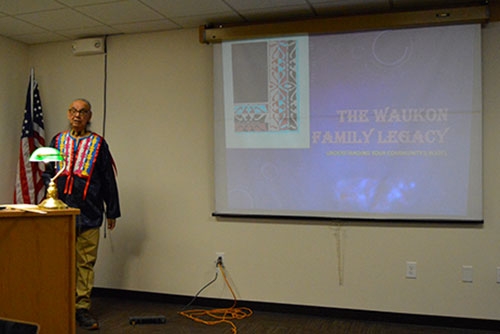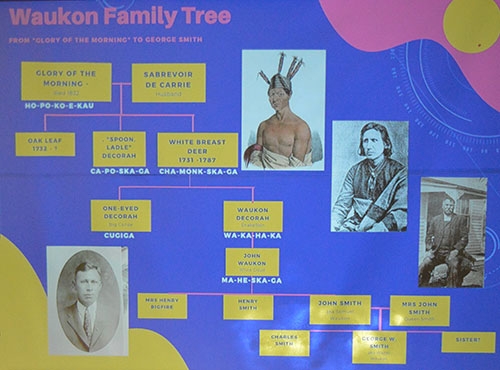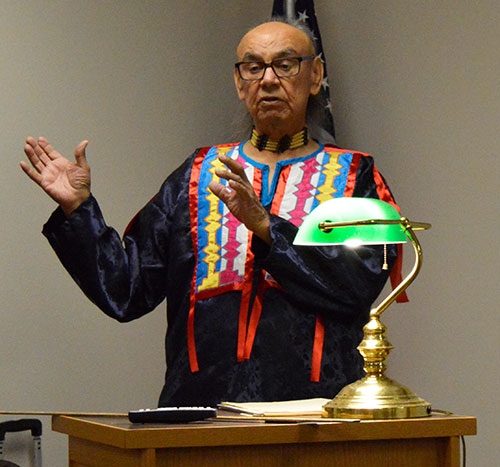You are here
Home ›Prosper Waukon makes a visit to his great-great-grandfather’s namesake

Visits his great-great-grandfather’s namesake ... Prosper Waukon, the great-great-grandson of Chief John Waukon, whom the Waukon community is named after, visited the tri-state area of Iowa, Minnesota and Wisconsin last week where his ancestors once lived. Part of his visit included a pair of presentations regarding the Waukon Family Legacy, Wednesday, June 26 at the Driftless Area Education and Visitors Center in Lansing and Tuesday, June 25 at Robey Memorial Library in Waukon, where he is pictured above presenting to a capacity crowd that evening. Standard photo by Joe Moses.

The early roots of the family tree ... The screen pictured above shows the early ancestral roots of Prosper Waukon, who is the great-great-grandson of Chief John Waukon and who visited the tri-state area last week where his ancestors once lived. The screen, which was part of a presentation given by Prosper Waukon on the Waukon Family Legacy held at Robey Memorial Library in Waukon Tuesday, July 25, shows an image of Chief John Waukon, after whom the Waukon community is named, in the middle photo of the three photos pictured at right. Standard photo by Joe Moses.

Prosper Waukon ... Standard photo by Joe Moses.
by Joe Moses
Prosper Waukon, the great-great-grandson of Chief John Waukon, after whom the city of Waukon is named, provided a presentation “The Waukon Family Legacy: Understanding Your Community’s Roots” followed by a Question & Answer (Q&A) session in the community room of Robey Memorial Library in Waukon Tuesday, July 25 with over 80 members of the public in attendance. The July 25 presentation was one of several stops for Prosper and his wife, Jan, while visiting Allamakee County, as he also made that same presentation Wednesday, July 26 at the Driftless Area Education and Visitors Center in Lansing.
Prior to the start of his presentation at Robey Memorial Library, Prosper Waukon shared some information with The Standard relating to his background and personal journey which brought him to visit the community of Waukon and Allamakee County. As the great-great-grandson of Chief John Waukon, Prosper’s connection to this area is a given considering his heritage and family name. Currently a resident of Arizona, Prosper Waukon noted that he lived with and was raised by his grandparents in a wooded area near the Missouri River in northeast Nebraska starting at the young age of two years old.
His grandfather, George W. Smith, began teaching Prosper about the Waukon family legacy starting at three or four years of age through verbal history which Prosper memorized and was tested about throughout his youth. As part of a long line of Winnebago hereditary leaders, Prosper discussed that his grandfather, a member of the Thunderbird Clan, a tribal leadership clan within the Winnebago Tribe, received letters encouraging a visit to Waukon during the former annual Waukon Threshing Days with a presentation of the “Key to the City” also being suggested.
Prosper added that his grandfather had said that they would make that visit to Waukon someday, but they never made that visit together before his grandfather’s passing in 1974. As a young boy, Prosper received encouragement from his grandfather to someday take back the Waukon family name, with his daughter echoing similar thoughts later in his life prompting him to do so in honor of that family heritage.
Prosper explained that his grandfather’s given name was Walter Waukon but was later changed to George W. Smith, with name changes like this encouraged during the federal government’s implementation of the Dawes Act, legislation breaking up tribal lands, in the late 1800s and early 1900s.
Prosper discussed the Waukon family name, making note of his great-great-grandfather John Waukon, great-grandfather Samuel Waukon (John Smith) and grandfather Walter Waukon (George W. Smith).
Prosper further noted that the Smith family name was chosen due to a Dawes Act era perception that Native American names were difficult to pronounce, with other English names being provided as suggestions at that time including “Smith”, “Richards” and “Jones”. Prosper advised that the Smith surname has created some confusion relating to the Waukon lineage, providing clarification that his great-grandfather, Samuel Waukon, chose “John” as his first name in honor of his own father, John Waukon, with the transition to the Smith surname. Prosper further noted U.S. Census and Bureau of Indian Affairs (BIA) records from the early 1900s and after as being valuable in confirming and clarifying the Waukon lineage.
Prosper provided some details about his life noting that his wife, Jan, was born and raised on the reservation with both her mother and father being missionaries and her father also being a minister. Prosper added that he and his wife knew each other as youths with their paths again meeting later in life and the two reconnecting and marrying.
Prosper noted that plans are being made for both he and his wife to return to Waukon next year, with his daughter and grandchildren to be included in that visit. Prosper’s personal and professional story is remarkable through his 40-plus years of leadership and management experience serving as CEO/President of four businesses and as a founding member of five non-profit organizations, with 28 of those years devoted to improving Indian businesses and organizations. In addition to serving on 22 community, city and state boards, Prosper has been involved in a variety of tribal programming benefiting youth and adults.
Prosper graduated from the University of St. Thomas in St. Paul, MN with a degree in Business Administration, returning to the University of St. Thomas to continue his Master of Business Administration (MBA) studies later in his career. Prosper shared that in 2021 he received some news relating to his health with a diagnosis of advanced liver disease. Despite this challenge, he has continued his efforts in community development and light physical activity as much as possible.
Prosper also shared his experience in reclaiming the Waukon family name noting the matter came up in a conversation in 1988 with his nine-year-old daughter. Like his grandfather before him, he discussed teaching her the verbal history and legacy of the family and tribe when she asked about the Smith name. He noted that she responded, “We are Ho-Chungra (also referred to as Ho-Chunk or Winnebago). We should have our name back.”
Having had the same conversation with his own grandfather many years earlier, Prosper agreed and moved forward with legally changing the family name from Smith back to the family’s original name of Waukon. He noted the legal proceedings and conversation the judge had with his daughter. Prosper noted that the judge asked, “Young lady, why do you want to change your name? Are you a criminal?”
Prosper further noted his daughter’s response, “No, it’s cultural reasons and we have a right to have our own name. We have a right to have our name back.”
Prosper advised that the court system was in agreement with those thoughts. He also said that later that same year following the annual powwow, he traveled through Waukon and made a brief visit including a stop at the library to view some documents. He noted a conversation with the librarian who viewed his I.D. and remarked, “That’s the name of our town!” with Prosper responding, “Yeah, I know.” Prosper added that quickly the mayor and a reporter came by with a tour of the museum taking place.
Prosper Waukon’s presentation at Robey Memorial Library, “The Waukon Family Legacy: Understanding Your Community’s Roots” provides information gained through verbal history taught during his youth and the “Masters Thesis: Winnebago Tribal History” by David Lee Smith cited as source material. Prosper’s presentation delved into the Waukon family history and lineage providing details about his great-great-grandfather John Waukon, the City of Waukon’s namesake, and information about John Waukon’s ancestors and descendants to present day.
The presentation moved into an overview of pivotal years during the 1800s with Prosper discussing the ceding of land and movement of tribes throughout the Midwest. This portion of the presentation involved several maps illustrating the approximate territory of the Ho-Chunk Tribe (also referred to as Hocak and Winnebago) prior to 1825 consisting of parts of Iowa, Wisconsin, Minnesota and Illinois. The establishment of Ho-Chunk land boundaries with the Treaty of 1825 and subsequent treaties, land boundaries and ceding of land including the future locations of the City of Decorah and City of Waukon was also discussed.

